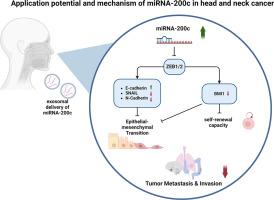探索miRNA-200c在头颈部鳞状细胞癌中的肿瘤抑制作用:外泌体介导的治疗应用的潜力和机制
IF 5
2区 医学
Q2 Medicine
引用次数: 0
摘要
头颈部鳞状细胞癌(HNSCC)由于其高复发、转移率和对常规治疗的耐药性,仍然是一种具有挑战性的恶性肿瘤。microRNA-200c (miRNA-200c)已成为HNSCC中一个关键的肿瘤抑制因子,具有抑制上皮-间质转化(EMT)的潜力,而上皮-间质转化被认为是癌症转移和进展的关键过程。有趣的是,在HNSCC中也有有争议的发现将miRNA-200c定性为致癌因子。这篇综述文章全面概述了目前对miRNA-200c在癌症,特别是在HNSCC中的一般作用的理解,强调了其作用机制,包括对EMT和其他致癌途径的调节。此外,本文还探讨了外泌体介导的miRNA-200c递送作为治疗策略的创新方法。外泌体作为天然的纳米载体,为靶向递送miRNA-200c到肿瘤细胞提供了一种很有前景的载体,有可能克服传统递送方法的局限性,提高治疗效果。本综述还讨论了miRNA-200c在临床应用中的挑战和未来方向,特别关注其改善HNSCC患者预后的潜力。本文旨在为研究人员和临床医生提供有价值的见解,以创新治疗这种侵袭性癌症类型。本文章由计算机程序翻译,如有差异,请以英文原文为准。

Exploring the tumor-suppressive role of miRNA-200c in head and neck squamous cell carcinoma: Potential and mechanisms of exosome-mediated delivery for therapeutic applications
Head and neck squamous cell carcinoma (HNSCC) remains a challenging malignancy due to its high rates of recurrence, metastasis, and resistance to conventional therapies. microRNA-200c (miRNA-200c) has emerged as a critical tumor suppressor in HNSCC, with the potential to inhibit epithelial-mesenchymal transition (EMT), which is considered as a key process in cancer metastasis and progression. Interestingly, there are also controversial findings in HNSCC characterizing miRNA-200c as oncogenic factor. This review article provides a comprehensive overview of the current understanding of miRNA-200c's general role in cancer, and particularly in HNSCC, highlighting its mechanisms of action, including the regulation of EMT and other oncogenic pathways.
Additionally, the review explores the innovative approach of exosome-mediated delivery of miRNA-200c as a therapeutic strategy. Exosomes, as natural nanocarriers, offer a promising vehicle for the targeted delivery of miRNA-200c to tumor cells, potentially overcoming the limitations of traditional delivery methods and enhancing therapeutic efficacy. The review also discusses the challenges and future directions in the clinical application of miRNA-200c, particularly focusing on its potential to improve outcomes for HNSCC patients. This article seeks to provide valuable insights for researchers and clinicians working towards innovative treatments for this aggressive cancer type.
求助全文
通过发布文献求助,成功后即可免费获取论文全文。
去求助
来源期刊

Translational Oncology
ONCOLOGY-
CiteScore
8.40
自引率
2.00%
发文量
314
审稿时长
54 days
期刊介绍:
Translational Oncology publishes the results of novel research investigations which bridge the laboratory and clinical settings including risk assessment, cellular and molecular characterization, prevention, detection, diagnosis and treatment of human cancers with the overall goal of improving the clinical care of oncology patients. Translational Oncology will publish laboratory studies of novel therapeutic interventions as well as clinical trials which evaluate new treatment paradigms for cancer. Peer reviewed manuscript types include Original Reports, Reviews and Editorials.
 求助内容:
求助内容: 应助结果提醒方式:
应助结果提醒方式:


